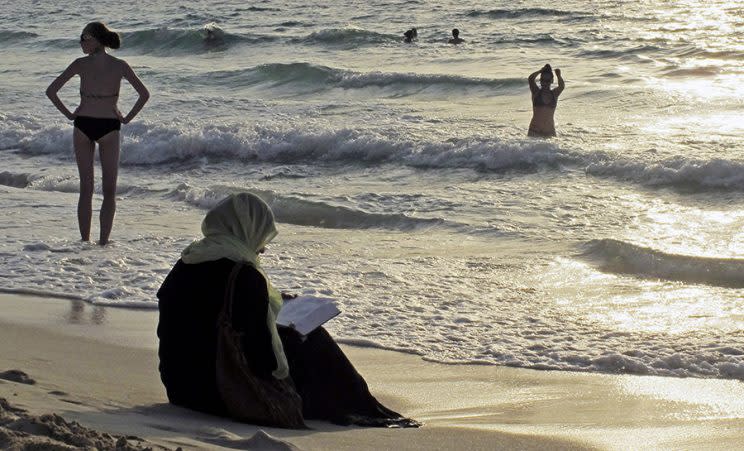Burkinis, Banned in France, Now Practically Required in Dubai

Two popular family beaches in Dubai are now requiring women to “wear respectful swimwear” and “be fully covered.” It’s the first stretch of Dubai’s public beach to have such rules. And those implementing them are not kidding: Staffers at the Dubai Offshore Sailing Club will be making sure that the new dress code is enforced, and that single men don’t enter these areas reserved for families only.
The modesty policy stands in stark contrast to the burkini-ban controversy that swept through France last year — an offshoot of rampant anti-immigrant and anti-Islamic sentiment in the country.
But Dubai, part of the United Arab Emirates, already has a modest dress code codified in its criminal law, requiring women to cover their shoulders and knees. And though Islam is the official state religion — with 76 percent of all citizens of the UAE identifying as such per the 2005 census — Dubai has a significant expatriate community, with 85 percent of its total population being expatriates and migrant workers. Non-Muslims are freely permitted to attend their own houses of worship and practice their own religion, but they also are expected to follow modesty laws, so it’s easy to understand why the new beach rules could be seen as useful reminders.
Dubai certainly isn’t the only country in the Middle East to make such a move. Last year, Israel’s Ministry of Culture introduced a modesty dress code for all performers at government-sponsored events. The policy was prompted by a state-backed concert by singer Hanna Goor, who was cut off when she performed on a Tel Aviv beach while wearing a bikini top. Israel also has certain beaches that are sex-segregated on certain days to accommodate Jewish Orthodox women who adhere to modesty codes.
Regarding Dubai’s latest move, a British tourist recently told the National, “I am quite happy to use that section of beach as there will be no single men there, no large groups of young people smoking and swearing around my kids, and no barely dressed women posing provocatively with selfie sticks.” Also, noted Vaishali Raj, head of fashion design at Amity University Dubai, “Emiratis dress conservatively, and expats are expected to do so as well. Visitors often lose recognition of the fact that Dubai is very much a part of the Islamic world. Liberal as it appears, the recently changed beach rules should be taken as a positive step to awaken tourists to the vast journey the place has traveled in its outlook in such a short span of time.”
Last summer, burkini designer Aheda Zanetti wrote in the British newspaper the Guardian about wanting to set the record straight regarding the French ban. She said that she invented the burkini “to give women freedom, not take it away,” citing the origin story of the style — Zanetti’s niece wanted to play volleyball, but was unable to find a team that would let her play while wearing her hijab, or religious head covering. When she finally found a team that would let her play, the apparel she had to wear to adhere to her own religious modesty standards while also participating in an athletic event were completely impractical, leaving her awkward and overheated. And so the burkini was born, giving Muslim girls the chance to freely practice their religion while also enjoying public participation in sports and recreation activities. And it’s how many will see the shifting rules in Dubai.
Read more from Yahoo Style + Beauty:
Follow us on Instagram, Facebook, and Pinterest for nonstop inspiration delivered fresh to your feed, every day. For Twitter updates, follow @YahooStyle and @YahooBeauty.
